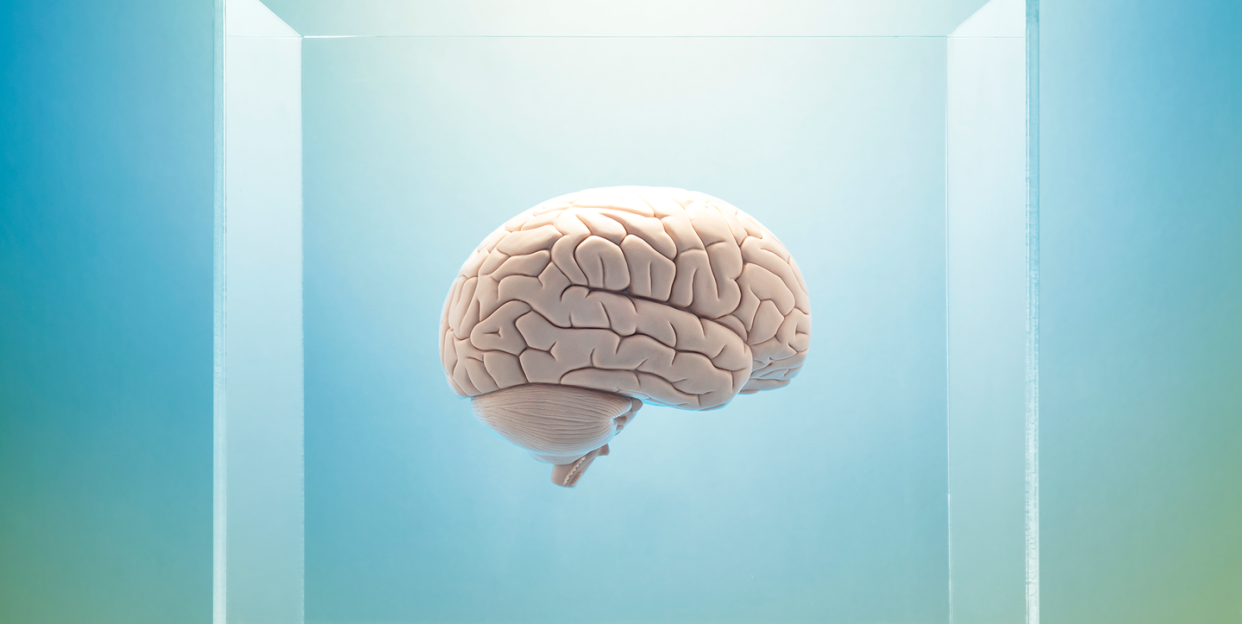3 Incredible Breakthroughs That Are Transforming Our Understanding of the Brain

- Oops!Something went wrong.Please try again later.
For a long time it was assumed that while, sure, brains were amazing, there wasn’t much you could do for an individual brain besides watch it decline. But scientists have made great strides in understanding the organ’s complexities, and their work is starting to affect our daily lives. Researchers are currently looking into more detailed brain imaging, better genetic-risk profiling, and dementia-related biomarkers in blood, urine, and spinal fluid—and that’s just diagnostics.
“In the past five to 10 years, the pace of brain research has sped up in all areas, from understanding cognitive decline to identifying steps we can take to reduce our risk of dementia to developing new treatments for Alzheimer’s,” says Brooks Kenny, executive director of WomenAgainstAlzheimer’s. “I think this is because the public, doctors, policymakers, and private-sector leaders are all recognizing that brain health is essential to individuals’ health and public health in today’s aging society.” There’s still work to be done, but here are three exciting areas of development.
Detecting Alzheimer’s earlier
Alzheimer’s disease (AD) can be a scary subject for anyone to talk about, and physicians are no exception. “Doctors can be reluctant to make a diagnosis of Alzheimer’s because they don’t feel comfortable, given the false impression that it can be diagnosed only through an autopsy,” says Marwan Sabbagh, M.D., F.A.A.N., director of translational research at Cleveland Clinic Lou Ruvo Center for Brain Health.
Thankfully, one recent advancement in the realm of Alzheimer’s is PrecivityAD, a test newly approved by the FDA that measures amyloid proteins in the blood. If levels are abnormal, extra testing or diagnostic scans might be recommended.
Join the conversation about brain health: Hear directly from top experts at You & Your Brain, a free webinar series on Tuesdays in June, hosted by Prevention, HealthyWomen, and the Women’s Alzheimer’s Movement.
“These kinds of blood tests could be used as a screening tool, like a prostate-specific antigen test for prostate cancer or hemoglobin A1C for diabetes,” says Dr. Sabbagh. “This is huge, because the earlier we can detect the disease, the greater the probability that we can create a strategy that can possibly help slow the rate of decline.”
Drugs to treat dementia
No medication for Alzheimer’s disease has been approved by the FDA in 18 years, but that may be about to change. First, a little background: People with AD tend to have clumps of beta-amyloid protein in their brains that damage cells. For years, scientists have been trying to prevent that buildup, and four drugs now in development may do it. The hope is that with the medication, certain antibodies will attach to the protein clumps in people with early symptomatic AD and signal to the body that they don’t belong; then the immune system would remove the protein and prevent further deterioration.
The first med, Aducanumab, is being considered for FDA approval this month. It’s not exactly a cure, but is a crucial step to a happier life: “The patients wouldn’t necessarily get better, but at the beginning of their disease we could identify them and start a treatment plan that would prevent or postpone dementia,” explains Dr. Sabbagh. In addition, the first drug to address dementia-related psychosis may be approved this year. Along with loss of memory, personhood, and independence, many people with dementia also experience hallucinations, delusions, or paranoia—this new medication, Nuplazid, works by blocking certain serotonin receptors.
A new way of thinking
“Brain health is really a whole new category,” says Sandra Bond Chapman, Ph.D., founder and chief director of the Center for BrainHealth at the University of Texas at Dallas. “When people talk about brain health, they talk about it as the absence of disease and injury, but that’s not the same as making your brain healthy.”
That wider view is what drives the BrainHealth Project, a study that looks at not only participants’ cognition, but also their well-being, social interactions, and daily routine. In the study, people are given the BrainHealth Index to arrive at a score more nuanced than, say, IQ (which Chapman says is outdated and comes with stigma), and each participant is paired with a coach to help them improve it via personalized healthy habits, such as doing critical-thinking tasks at times of the day when their brain is sharpest. In the initial 12-week trial, 80% of the participants improved their scores. “We know that a healthy brain is really the driver of all our life decisions to make us healthier,” says Chapman.
Take part in research
These breakthroughs have been made thanks to volunteers in trials—and scientists need more, especially healthy participants. “We know changes in the brain start 20 years before the first day of forgetfulness,” says Dr. Sabbagh. Kenny adds, “There is still a need for more research on brain health specifically among women and underrepresented communities. This is critical to better understand the complexity of the disease and find the right interventions for the right patients.” Here are reputable places to find trials:
This article originally appeared in the June 2021 issue of Prevention.
You Might Also Like

